-
Key Persons
-
Important Agreements
-
Chronology of Events
-
 Infographics
Infographics
-
Key Agencies
-
Chronology of Visits
-
 News
News
-
 Monthly Review
Monthly Review
- Russia and Tskhinvali Region plan to form relations like allied states.
- Firing points were organized in the Georgian enclaves of Tskhinvali Region before the war, in order to shoot towards Trans-Caucasian motorway. Several days before the beginning of military action, women and children left villages in Georgian enclaves. There is a suspicion that the men remaining there were being armed. There are facts confirming that special reinforced points were organized within the enclaves, with the purpose of opening fire.
- During the war, both sides resorted to excessive action; however, this was war and all sides have their own truth (said Lavrov about the demolition of Georgian enclaves in Tskhinvali Region).
- Moscow has information that Georgia is planning terrorist acts and provocations towards Abkhazia and Tskhinvali Region. According to some data, several hundred bandits were released from Georgian prisons some time ago, with the obligation of undertaking such provocations and terrorist acts.
About the placement of the employees of the Russian “Embassy” in Tskhinvali, Lavrov stated that Moscow will find a way to temporarily place employees so that the population of Tskhinvali Region is not hurt. According to him, it will be more difficult to organize Russian “Embassy” in Tskhinvali Region, as compared to Abkhazia.
The main result of Lavrov’s two-day visit to Abkhazia and Tskhinvali was making a statement about signing basic agreement for cooperation and mutual assistance in the nearest future. Lavrov also stated about signing the whole series of agreements for cooperation in economic, social, military and maritime fields.
Lavrov’s first visit to Tskhinvali Region had quick results in the diplomatic field. First “Ambassador” of Russia to Tskhinvali Region, Elbrus Kargiev, was appointed on September 25, 2008. Russian “Embassy” to Tskhinvali Region started working in April 2009.
[pic] => files/kremlin/visits/lavrov.jpg ) [2] => Array ( [id] => 6 [preson_id] => 2 [region] => 2 [date] => 2009-07-13 [title] => Dimitri Medvedev’s Visit to Tskhinvali Region [content] =>On July 13, 2009, President of the Russian Federation, Dimitri Medvedev, visited Tskhinvali for the first time since the 2008 Russia-Georgia War. He flew to Tskhinvali by a helicopter from Mozdok military base in North Ossetia. Medvedev was met by thousands of applauding supporters in Tskhinvali. Medvedev’s visit was a surprise not only for the population, but Ossetian officials as well, including de facto President Eduard Kokoiti.
Context of the Visit
A week before Medvedev’s visit to Tskhinvali, President of the United States, Barack Obama, was in Moscow, where they announced about the beginning of a historic reset policy. On July 7, during his speech at the Russian School of Economics, Obama stated that the US supports the territorial integrity of Georgia. Counter-balancing Obama’s statement with Medvedev’s visit to Tskhinvali, the Kremlin attempted to demonstrate that the reset policy does not mean abdicating spheres of influence in the post-Soviet area. In addition, there were suspicions in the occupied regions that due to the warming of relations between Russia and the US, the former’s interest towards Tskhinvali region would be weakened.
It is interesting to note that Medvedev’s visit to Tskhinvali coincided with several developments: on July 20-24, the Vice President of the United States, Joe Biden, had planned a visit to Georgia and Ukraine; on July 14, U.S.S. Stout entered Batumi Sea Port to participate in a joint US-Georgia maritime exercise. Apart from this, the NABUCCO Pipeline project was signed in Ankara on the same day, which aimed to transport Caspian energy resources bypassing Russia.
Cooperation in the Field of Military
During his visit to Tskhinvali Medvedev went to a newly built 4th Russian Military Base. At the base, Medvedev was hosted by Commander of the North Caucasus Military Oblast, General-Colonel Sergei Makarov, who led the Russian army during the War with Georgia. During his visit, Medvedev was also accompanied by the Minister of Defence of Russia, Anatoly Serdiukov.
At his meeting with Kokoiti, Medvedev promised the Ossetian side economic and military support. “We have whole series of projects for restoring the economic and social fields of the republic. There is also need for support and cooperation in the field of defense”, said Medvedev.
Assistance to Tskhinvali Region will Continue
No agreements were signed during Medvedev’s short visit. During the visit Medvedev underlined that Russia would continue funding Tskhinvali region’s reconstruction, despite the fact that he sees that the money of Russian tax payers has evaporated, as a big part of the city is still in ruins.
At his meeting with Kokoiti Medvedev also talked about developing bilateral relations, reconstruction work after the war and state-to-state cooperation in various fields.
In Tskhinvali, Medvedev honored the memorial of those killed in Georgian-Ossetian conflict and held introductory meetings in various districts of the city. He also inspected the Parliament building and No. 5 public school that were damaged during the war.
At the end of Medvedev’s visit, according to the official Kremlin statement “issues of the joint implementation of social-economic rehabilitation projects of Tskhinvali region were discussed”.
In a month after Medvedev’s visit to Tskhinvali, on August 12, 2009, Prime Minister of the Russian Federation, Vladimir Putin, visited Abkhazia.
[pic] => files/kremlin/visits/2_1_Medvedev-2009.jpg ) [3] => Array ( [id] => 1 [preson_id] => 1 [region] => 1 [date] => 2009-08-12 [title] => Vladimir Putin`s Visiti to Abkhazia [content] =>On August 12, 2009, the Prime Minister of the Russian Federation, Vladimir Putin visited Abkhazia for the first time since the 2008 Russia-Georgia War. Putin was vacationing in Sochi when he unexpectedly cut his vacation short and paid a short visit to Sokhumi. A month earlier, on July 13, 2009, President of Russia, Dimitri Medvedev, also visited Tskhinvali region for the first time since the War.
Putin used his first Abkhazian visit to voice political messages towards Georgia and the international community. He started his visit by going to the memorial of those killed in the 1992-1993 Georgian-Abkhazian confrontation. In terms of the visit, Putin also met the de facto President of Abkhazia, Sergei Baghapsh, after which negotiations with extended personnel were held between the Russian and Abkhazian sides. Putin also met with Baghapsh’s opposition. After finalizing the official program, Putin also met Abkhazian elders.
Field of Security – Strengthening Border Defense
Field of security was also the main topic in the interviews given to the Abkhazian media by Putin prior to his visit. Before the visit Putin stated that Russia plans to strengthen its positions in the field of security of Abkhazia: “Russia will place military forces in Abkhazia. We will build a modern border defense system. All of these measures will be additional serious guarantees of security for Abkhazia and Tskhinvali region. All this will cost RUB 15-16 billion (USD 463 million).” According to Putin, he was not excluding a new conflict in the region while President of Georgia, Mikheil Saakashvili, remained in power. However, he stated that any attempts by Georgia to use force against Abkhazia and Tskhinvali region would be “much more difficult” after the 2008 War.
On the first anniversary of Russia-Georgia War, Putin named the strengthening of Abkhazia’s security as a priority. He stated that Russia would spend USD 500 million for boosting its military presence in Abkhazia. He also said that this money would be spent on strengthening Russian military bases in Abkhazia and the security of the de facto administrative border.
Putin named strengthening the border as one of the priorities. This visit confirmed that Russia would not be increasing the number of its troops in Abkhazia. Member of Putin’s delegation, Minister of Defense of Russia, Anatoly Serdiukov, made a statement about this. He said that “the number of troops in Abkhazia will no longer increase and 3,636 people that are designated to serve on the base are enough”.
Social-Economic Field – Assistance Will Continue
During his visit Putin also focused on the social-economic issues. He promised Abkhazians that he would continue paying pensions to them and ensure the supply of the capital necessary to restore Abkhazian economy. According to Putin’s statement, in 2009, despite the financial crisis, Russia allocated USD 80 million to Abkhazia in the form of budgetary support. Member of Putin’s delegation, President of the Russian oil company RosNeft stated that his company would help Abkhazia in discovering oil fields on its territory and developing them.
Putin stated that during the following year, special attention would be paid to ensuring Abkhazia’s security and social-economic development, for which RUB 10-11 billion had already been allocated in the period of 2010-2011. Putin said that the allocated resources would be spent on infrastructure, communication, transport, healthcare and educational objects. It is interesting that Putin stated about the allocation of resources not during his negotiations with Baghapsh, but during the meeting with the Abkhazian opposition, which was also attended by the former Vice President, Raul Khajimba. Khajimba was personally supported by Putin in the previous illegitimate elections.
Issue of Recognition
Putin did not pay serious attention to Abkhazia’s international recognition during his press conference and stated that Abkhazia does not require recognition from states other than Russia. Putin’s statement was made as Abkhazia was expressing its readiness for developing political and economic cooperation with countries other than Russia as well, especially Turkey, where Abkhazian diaspora lives.
Putin also stated that the world opinion has changed in Russia’s favor since 2008 and “practically the whole international community” has recognized that Georgia was an aggressor in the conflict.
Twin Boys – Valodia and Dimitri
In terms of his visit Putin, together with Baghapsh, also visited a newly opened maternity center in Sokhumi, where the chief doctor of the center, Liana Achba, stated to the guests that a young lady had given birth to twin boys several minutes before their arrival and through the joint decision of the mother and the maternity center personnel – they had been named Valodia and Dimitri (in honor of Vladimir Putin and Dimitri Medvedev).
Explosion in Sokhumi
On the day of Putin’s visit to Abkhazia, explosions took place on Sokhumi and Gagra, taking the lives of two people. Abkhazian side named Georgian security forces as the organizers of the explosions, who, according to the First Deputy Prosecutor of Abkhazia, could not cope with recognition of Abkhazia’s independence and Putin’s visit to Abkhazia.
[pic] => files/kremlin/visits/1_1_Putin_in_Abkhazia-20091.jpg ) [4] => Array ( [id] => 10 [preson_id] => 3 [region] => 1 [date] => 2009-10-02 [title] => Sergei Lavrov’s Visit to Abkhazia [content] =>On October 2-3, 2009, Minister of Foreign Affairs of the Russian Federation, Sergei Lavrov, visited Abkhazia. This was Lavrov’s second visit to Abkhazia after the August 26, 2008 Russian recognition of Abkhazian independence – the first one took place on September 14, 2008. In terms of the visit, Lavrov met the de facto President of Abkhazia, Sergei Baghapsh and de facto Minister of Foreign Affairs of Abkhazia, Sergei Shamba. Lavrov’s visit to Abkhazia took place two days after the publishing of the report by EU research commission on the reasons of 2008 Russia-Georgia War.
Minister of Foreign Affairs of Russia, Sergei Lavrov, visited Abkhazia. The main achievement of Lavrov’s visit was signing the agreement on visa free travel between Russia and Abkhazia. Together with the de facto Minister of Foreign Affairs of Abkhazia, Sergei Shamba, Lavrov signed an agreement that would enable citizens of Abkhazia and Russia to travel visa free for 90 days on each other’s territories. According to Lavrov’s statement, the agreement would enable the crossing of Abkhazian-Russian border not only through diplomatic, service and travel passports, but also through Russian and Abkhazian internal passports as well. Lavrov stated that in order to make the process of crossing the bordereasier, the border crossing points would be technically updated and a new bridge built.
During his meeting with Shamba, Lavrov also stated about reaching an agreement regarding cargo escort. According to Lavrov, it is possible to ensure the transportation of cargo from high seas towards Abkhazia is such a manner, that it would not allow the repetition of Georgian provocation. Lavrov stated that the importance of this issue is due to the fact that Georgia considers Abkhazian territorial waters to be its own, arresting all ships moving towards Abkhazian ports without Tbilisi’s permission.
During his visit to Abkhazia, Lavrov was also forced to refute news disseminated in the press. According to the information spread in the Turkish press, Russia might recognize the Turkish Republic of North Cyprus in return for Ankara’s recognition of Abkhazia and Tskhinvali Region as independent states. Turkish media was saying that parties were considering reaching such an agreement. Lavrov denied the possibility of reaching that agreement. He stated that Russia would not recognize North Cyprus in return for Turkish recognition of Abkhazia. “We do not adhere to such exchanges with the logic – you me, me – you. These are completely different stories. Any kind of trade is unacceptable in this regard,” said the Minister. According to Lavrov assessment, the two cases are fundamentally different, both historically, as well as in terms of international law. According to him, Abkhazia was once a Soviet Republic and while the President of Georgia, Mikheil Saakashvili, made an unsuccessful attempt to return Tskhinvali Region under the control of central Georgian government in 2004, Greece has never attempted such a military adventure against North Cyprus.
An important statement was made during the visit regarding the transfer of Abkhazia to Russian international telephone code. Lavrov said that Abkhazia will start using Russia’s +7 international telephone code, instead of the Georgian one. Lavrov stated that Russia will continue working with the international organizations on assigning a separate code for Abkhazia.
During Lavrov visit, Russian and Abkhazian sides also exchanged their views regarding the results of the latest round of Geneva discussions.
After meeting Baghapsh and Shamba, Lavrov also met with the employees of the Border Guard of Russian Security Service and 7th Russian Military Base. Apart from this, Lavrov also met professors and students at the State University of Abkhazia, where he delivered a speech and answered questions.
[pic] => files/kremlin/visits/lavrov.jpg ) [5] => Array ( [id] => 5 [preson_id] => 2 [region] => 1 [date] => 2010-08-08 [title] => Dimitri Medvedev’s Visit to Abkhazia [content] =>On August 8, 2010, on the second anniversary of Russia-Georgia War, the President of the Russian Federation, Dimitri Medvedev, paid an unplanned visit to Abkhazia. This was his first visit to Abkhazia after the 2008 Russia-Georgia War. Also, this was the first visit of a Russian President to Abkhazia. Prior to that, Vladimir Putin visited Abkhazia as a Prime Minister in 2009.
In terms of the visit, Medvedev met the de facto President of Abkhazia, Sergei Baghapsh, to whom he promised the full development of relations in the fields of politics, economy and security. He also inspected the Russian military base in Gudauta.
During the visit Medvedev stated that “despite the statements of Western politicians and talks about the reasons of the 2008 August War, there are real facts that were presented by the Russian, Abkhazian and South Ossetian sides, which were also recorded in the Heidi Tagliavini Report, who led the efforts of the European Commission in investigating the August events.”
After the official meeting, Medvedev and Baghapsh had coffee at a famous place in Sokhumi – Brekhalovka, in a legendary café У Акопа, where Medvedev talked to locals and tourists. After this, Medvedev took a stroll in the center of the city and observed the state structures that were built through Russian funding, including the State Philharmonic Hall and Alexander Pushkin School. At the end of the visit, Medvedev honored the memory of those killed in 1992-1993 Georgian-Abkhazian confrontation.
[pic] => files/kremlin/visits/2_2_Medvedev_2010.jpg ) [6] => Array ( [id] => 11 [preson_id] => 3 [region] => 2 [date] => 2011-04-25 [title] => Sergei Lavrov’s visit to Tskhinvali region [content] =>On April 25, 2011, Minister of Foreign Affairs of the Russian Federation, Sergei Lavrov, visited Tskhinvali Region. A day after he visited Sokhumi. Lavrov’s visit was pre-planned and his delegation included the Head of North Ossetian Republic of Alania, Taimuraz Mamsurov, Deputy Minister of Foreign Affairs of Russia, Grigori Karasin, Director of the 4th CIS Department of the Ministry of Foreign Affairs of Russia, Andrei Kelin, and “Ambassador” of Russia to Tskhinvali region, Elbrus Kargiev.
After meeting the de facto leaders of Tskhinvali Region, Lavrov was granted the “Order of Honor”, which was followed by the signature of a bilateral agreement by two foreign ministers – on the establishment of informational-cultural centers and their work, enactment of the government agreement on visa free travel, exchanging diplomatic notes about the finalization of intra-state procedures (visa free travel started from this day), principles of cooperation in the field of transport, air search activities and cooperation in rescue activities.
Lavrov also touched upon the issue of the Geneva Discussions and vowed to provide comprehensive help to Tskhinvali in international affairs and strengthening its statehood. During the visit Lavrov stated that it is a priority for Moscow to ensure the guarantee of the non-use of force against the non-recognized republics.
Lavrov put the blame for the 2008 August War on Georgia. According to him, Russia does not ask for contributions, but it does plan to restore justice, which will be done on the basis of international law. Lavrov stated that Russia supported the address of the citizens of Tskhinvali Region to the European Court of Human Rights and it will be providing them with consultation as well as legal and expert help.
[pic] => files/kremlin/visits/3_4_Lavrov_meet_Kokoiti-2011-photo_mfa-rso.jpg ) [7] => Array ( [id] => 12 [preson_id] => 3 [region] => 1 [date] => 2011-04-26 [title] => Sergei Lavrov’s Visit to Abkhazia [content] =>On 26 April, 2011, the Minister of Foreign Affairs of the Russian Federation, Sergei Lavrov, visited Abkhazia. A day earlier, Lavrov was visiting Tskhinvali Region. At the beginning of the visit, Lavrov honored the memory of those killed in the Georgian-Abkhazian confrontation, at the glory memorial, together with the de facto Prime Minister of Abkhazia, Sergei Shamba. From there, he went on foot to the de facto President’s administration building, where he first met the de facto President Sergei Baghapsh and later met with the members of the de facto government in an extended format.
During the visit, an intergovernmental agreement was signed on the establishment of Abkhazian and Russian informational-cultural centers and their rules of procedure. Lavrov and Shamba exchanged diplomatic notes regarding the implementation of intra-state procedures connected with the bilateral agreement on visa free travel for Abkhazian and Russian citizens. On the same day, Lavrov awarded Shamba with a medal of the Russian Federation for his “Contributions to International Cooperation.”
During a short press conference held after the official meeting, Baghapsh and Lavrov answered the journalists’ questions:
- Lavrov positively assessed the dynamics of the development of Russian-Abkhazian relations. He said that a solid agreement and legal base had been created, which define the allied nature of relations. Lavrov said that they would ensure the security and the protection of the Abkhazian borders together and that the already mentioned legislative basis enabled Russia and Abkhazia to intensively and closely cooperate on social-economic issues.
- Lavrov stated that the document on the creation of cultural centers was added to the already existing 58 intergovernmental documents and that 40 additional documents were being developed, that would cover all spheres of bilateral cooperation.
- Lavrov stated that the most important task in terms of international relations was to “ensure security in the region”. According to him, it is especially important to Russia for Abkhazia and Tskhinvali Region to feel themselves secure and have the opportunity to establish normal contacts with the outside world.
During the visit Lavrov also touched upon the problematic issues in bilateral relations, that he stated needed to be resolved: first of them was the issue of property and secondly, the preparation of the agreement on establishing borders, their delimitation and then demarcation. The issue of property rights was especially pressing, touching upon the cases of taking away homes.
Lavrov visit took place amid scandals regarding the aforementioned pressing issues. Before his visit, Russia’s territorial pretenses towards Abkhazia were stated regarding the village of Aibga. In addition, Abkhazia was also considering the issue of returning the properties that belonged to the IDPs from Abkhazia that later became Russian citizens. In this case, the Abkhazian side saw problems in those IDPs that were ethnically Georgian and had acquired Russian citizenship. Certain discontent before Lavrov’s visit was also caused by the closing down of Russian military sanatorium for a major rehabilitation, causing 1,300 employees to be suspended.
In terms of the visit Lavrov went to the military settlement of the Russian Federal Border Service in New Athos, participated in the presentation of a book titled Russians in Abkhazia, as well as the launching of a lead pumping station in Gudauta municipality village of Aaatsi, which was funded by Russian money. Lavrov also inspected the part of the rails that was being constructed with the help of the Russian railway. He also awarded an Order of Friendship to the Artistic Director of the Russian Drama Theater, Nina Balaeva.
[pic] => files/kremlin/visits/3_5_Lavrov_meet_Bagapsh-2011.jpg ) [8] => Array ( [id] => 2 [preson_id] => 1 [region] => 1 [date] => 2011-06-02 [title] => Vladimir Putin’s Visit to Abkhazia (June 2, 2011) [content] =>On June 2, 2011, Prime Minister of the Russian Federation, Vladimir Putin, made an unplanned visit to Abkhazia. It was his second visit to Abkhazia after the 2008 Russia-Georgia War. Putin attended the funeral of the de facto President of Abkhazia, Sergei Baghapsh. Baghapsh, who was the de facto President of Abkhazia since 2005, died in a hospital in Moscow on May 29, 2011. He was undergoing an operation on his lungs. Putin personally honored Baghapsh’s memory and expressed his condolences to his daughter and widow.
During his visit Putin met the de facto Acting President of Abkhazia, Aleksandre Ankvab and de facto Prime Minister of Abkhazia, Sergei Shamba. During the meeting Putin stated to the de facto leaders of Abkhazia that their country can count on Russia’s support including RUB 10 billion (USD 360 million) assistance that the Kremlin allocated for Abkhazia in 2011.
Putin promised Ankvab to help in development problems. Putin told Shamba that he “hopes that relations between Georgian and Abkhazian people will be restored in all directions. We will support your external ties with any state, including the closest neighbors. Time heals all wounds. I hope that relations between Georgian and Abkhazian people will be restored”. During the meeting Putin also told Shamba that Russia may increase financial assistance to Abkhazia.
During the visit Putin was accompanied by the Head of the Presidential Administration, Sergei Narishkin, Minister of Regional Development, Viktor Basragin and Governor of Krasnodar Oblast, Aleksandr Tkachev.
[pic] => files/kremlin/visits/1_2__Putin-2011.jpg ) [9] => Array ( [id] => 7 [preson_id] => 2 [region] => 2 [date] => 2012-12-08 [title] => Dimitri Medvedev’s Visit to Tskhinvali Region [content] =>
On August 8, 2012, on the fourth anniversary of Russia-Georgia War, Prime Minister of the Russian Federation, Dimitri Medvedev, visited Tskhinvali region. Medvedev met with the de facto President of Tskhinvali Region, Leonid Tibilov, mainly focusing on the War and issues of Tskhinvali Region’s security. According to Medvedev’s statement, “four years ago people died as a result of a barbaric aggression”, “Russia had to make a decision about protecting the population of South Ossetia and repelling the aggressor. This happened timely and swiftly enough to avoid further losses. I will not hide that this was a special day for me, as I had to make difficult, including military decisions, which, ultimately, restored balance and what is more important, brought peace to South Ossetia. This was a correct and just decision”. According to Medvedev, Russia would boost assistance to Tskhinvali Region as well as “the protection of the people of South Ossetia”.
This was Medvedev’s second visit to Tskhinvali Region. Prior to this, he visited Tskhinvali on July 13, 2009, during his Presidential tenure. On August 8, 2010, Medvedev also visited Abkhazia as a President.
[pic] => files/kremlin/visits/2_3_Medvedev_2012.jpg ) [10] => Array ( [id] => 3 [preson_id] => 1 [region] => 1 [date] => 2013-08-25 [title] => Vladimir Putin’s Visit to Abkhazia (August 25, 2013) [content] =>On August 25, 2013, President of the Russian Federation, Vladimir Putin, visited Abkhazia in his Presidential position for the first time. This was his third visit to Abkhazia since the 2008 Russia-Georgia War. Putin met the de facto leader of Abkhazia, Aleksandre Ankvab in Bichvinta, in a government (former Soviet) dacha (the dacha was a popular resting place for Soviet leaders, built at the order of the Secretary of the Central Committee of the Communist Party of the Soviet Union, Nikita Khrushchev in 1960. It was during his vacation at this dacha that Khrushchev learned about the fact that he had been deposed by the Plenum of the Central Committee of the Communist Party of the Soviet Union. In 1974, Khrushchev’s successor, Leonid Brezhnev, even hosted French President Georges Pompidou at the dacha).
The visit coincided with an important date. On August 26, Abkhazia celebrated five years since Russia’s recognition of its independence. According to the Kremlin’s statement “the leaders discussed issues of bilateral cooperation during the talks.”
[pic] => files/kremlin/visits/1_3_Putin_2013.jpg ) [11] => Array ( [id] => 13 [preson_id] => 3 [region] => 1 [date] => 2017-04-18 [title] => Sergei Lavrov’s visit to Abkhazia [content] =>On April 18-19, 2017, the Minister of Foreign Affairs of the Russian Federation, Sergei Lavrov, paid his fourth visit to Abkhazia after the 2008 Russia-Georgia August War. His previous visit to Abkhazia took place in 2011. This time, the main purpose of the visit was to open the new Russian “Embassy” building in Abkhazia. However, non-formal reasons of the visit also included getting acquainted with the leaders of the Parliament elected as a result of March 12, 2017 illegitimate elections, as well as presenting new Russian “Ambassador” to Abkhazians.
From the Abkhazian side, Lavrov was met at the airport by de facto President, Raul Khajimba, de facto Minister of Foreign Affairs, Daur Kove, de facto Ambassador of Abkhazia to Russia, Igor Akhba while from the Russian side he was met by the “Ambassador” of Russia to Abkhazia, Semion Gregoriev. Lavrov was met at the airport traditionally – with a horn and wine. Soon after his arrival, Lavrov opened the new Russian “Embassy” building complex, which had already been functioning for practically a month.
The “Embassy” was opened in Sokhumi center, next to the Park of Glory. The construction of the complex started in 2013 while the land plot was turned over to Russia back in 2008. As a result of the opening of the new complex, Russian “Embassy” and “Consulate” will be working in the same complex. Prior to this, the “Embassy” was located in the former headquarters of CIS peacekeeping forces, on the territory of Sukhumi sanatorium.
With regard to the opening of the “Embassy” Lavrov stated that “the building is located in the central part of the city, which creates a very comfortable environment for the employees. The fact that we have opened such a large “Embassy” in Abkhazia further underlines our alliance”. Khajimba, in his turn, stated that “the opening of the “Embassy” is the confirmation of how Abkhazia and Russia are developing their relations”.
On the second day of the visit, April 19, Lavrov started by visiting the glory memorial in Sokhumi, after which he had negotiations with Khajimba and Kove. At the meeting with Khajimba, Lavrov stated that “the participation in Geneva discussions must continue actively, as it slowly, but surely delivers results. I am convinced that signing a legally binding agreement on the non-use of force is quite realistic in the near future, which will be an important signal for the whole Caucasus region”.
During the visit Lavrov focused on the issues of security. About the possibility of Abkhazia’s cooperation with the Collective Security Treaty Organization, Lavrov stated that “Russia welcomes such cooperation; however, this requires the consent of all member states of the organization. The organization is determined to ensure the security of its member states, while in the case of Abkhazia, its security is ensured by Russian armed forces, in cooperation with Abkhazian armed forces”.
About the simplified procedures of getting Russian citizenship for Abkhazian citizens, Lavrov stated that the project of the respective agreement had been given to the Abkhazian side a year before. Khajimba responded that the project was being considered by the government and would be presented to the Parliament as well.
On transporting cargo through Abkhazia, Lavrov stated that not only Abkhazia, but Russia is also interested in this. “Russia has no problems with restoring transit. There is legislative base to do this and it can be based on the agreement reached between Russia and WTO in 2011, when Russia became a member of the organization. We know that our Armenian colleagues are interested in transit. Today, the leader of Abkhazia also stated that his country is not against it and now, this is no longer dependent on us, but on the countries through which the transit must pass.”
During the working visit Lavrov also went to the famous “Brekhalovka” where he tasted coffee with the hosts. After this, Lavrov visited Fasil Iskanderov Russian Drama Theatre, where he observed a photo exhibition of the Theatre’s various plays, captured by Sputnik correspondent Tomas Thaitsuk. Lavrov also managed to see a short excerpt from one of the plays.
According to the information disseminated in the media, Lavrov was also supposed to present the candidate for the new Russian “Ambassador” to the Abkhazian political elite; however, the name of the substitute for the incumbent “Ambassador” Semion Gregoriev was not voiced during the visit.
[pic] => files/kremlin/visits/3_6_Lavrov_meet_Khajimba-2017.jpg ) [12] => Array ( [id] => 4 [preson_id] => 1 [region] => 1 [date] => 2017-08-08 [title] => Vladimir Putin’s Visit to Abkhazia [content] =>On August 8, 2017, after a four-year interval, President of the Russian Federation, Vladimir Putin, paid a short (total of 2 hours) visit to Abkhazia on the 9th anniversary of Russia-Georgia War. Putin flew to Bichvinta on a helicopter, where he met the de facto President, Raul Khajimba, face to face, on a government dacha formerly designated for Soviet leaders. Putin’s visit in 2013 also took place on this dacha. This was Putin’s second visit to Abkhazia as a President and his fourth visit overall, as President and Prime Minister. Apart from Putin’s helicopter, seven more helicopters landed on the landing pad in Bichvinta resort zone, after which, meeting with Khajimba started. The meeting lasted half-an-hour. After this, an extended delegation meeting was held. After the end of the meeting, Putin and Khajimba headed to Sochi by helicopter, where they attended a martial arts tournament in Sambo.
Apart from other officials, Putin’s delegation also included his assistant, curator of Abkhazia and Tskhinvali region, Vladislav Surkov, Deputy Secretary of the National Security Council, Rashid Nurgalyev and Deputy Minister of Foreign Affairs, Grigori Karasin. From the Abkhazian side, the meeting was attended by Vice President, Vitali Gabnia, Secretary of the National Security Council, Mokhamed Kilba, Head of the Presidential Administration, Daur Arshba, Prime Minister Beslan Bartsits and others.
Context of the Visit
Putin’s visit took place following important developments in Abkhazia. Prior to this, an explosion of the combat material depot of the de facto Ministry of Defense of Abkhazia in Gudauta district village of Primorskoe (August 2, 2017) injured 64 people and killed two tourists form St. Petersburg. A little earlier, Russian citizen was killed as a result of an attack by a local from one of Gudauta district villages on Russian tourists (July 11, 2017), which sparked anti-Abkhazian sentiments in Russian news media, dealing a heavy blow to the tourist season in Abkhazia. Russian media paid less attention to Putin’s visit, focusing more on the explosion in Primorskoe and attack on the Russian tourists.
With this visit, Putin tried to assuage the fears of his compatriots, indicating that Russia considered Abkhazia a reliable partner on the state level and was only looking for ensuring the security of its citizens.
Putin's visit also coincided with the next round of domestic political confrontations in Abkhazia, which was connected with the consideration of various aspects of cooperation with Russia. More specifically, part of Abkhazians was not enthusiastic to cooperate with Russia, which was also manifested in the prolongation of negotiations and the ratification process.
A week before Putin's visit, the Vice President of the United States, Mike Pence, was visiting Tbilisi on August 1, stating his support for Georgia and condemning the aggression and the occupation of its territories by Russia. During his visit to Tbilisi, Pence also attended joint Georgian-American military exercises.
Agreement on Medical Insurance
An important event during Putin’s visit was signing an agreement regarding medical insurance. The de facto Minister of Health of Abkhazia, Tamaz Tsakhnakia, and the Minister of Health of the Russian Federation, Veronica Skvartsova, signed an agreement on cooperation in the following fields: organizing medical insurance for Russian citizens permanently living on the territory of Abkhazia in terms of the obligatory health insurance of the Russian Federation and on making healthcare available to them in the medical organizations of the Russian Federation. The agreement would enable Russian citizens permanently living in Abkhazia to access medical insurance and assistance in Russia.
The issue of medical insurance became important after, according to the opinion of the de facto leaders of Abkhazia, the movement of Abkhazians to Georgia for medical treatment took an alarming form. After the signature, the de facto Minister of Health of Abkhazia expressed his conviction that the number of Abkhazians that were going to Georgia for medical treatment would sharply decrease after the signature.
The ratification of the agreement on health insurance took place in February 2018. In May of 2018, seven points were opened on the territory of Abkhazia for distributing medical insurance policies.
Facilitating Trade
During the visit, Putin also stated that the customs procedures and phytosanitaric control would also change in bilateral trade. According to Putin's statement, the majority of Abkhazian exports to Russia are fruit and vegetables and given the restriction of exports from Abkhazia to certain countries, there is a good possibility to increase the supply of Abkhazian products to the Russian market. During the visit Putin also stated that various Projects are being implemented with the help of Russian banks in the field of tourism, agriculture and food production – with the overall value of RUB 1 billion.
In terms of the visit Putin also stated that the funding of investment projects designated for Abkhazia in the years from 2017 to 2019 would be RUB 6 billion. According to Putin’s statement, Russia and Abkhazia have common history and spiritual closeness and Russia will be ensuring the social and economic development of Abkhazia.
Field of Security – Joint Coordination Center of the Ministries of Internal Affairs
During the same meeting Putin underlined that the creation of joint informational-coordination center between the respective Ministries of Internal Affairs will boost common efforts of combating crime, expressing his hope that the new structure would ensure safety of Russian tourists in Abkhazia.
The agreement on the Formation and Rules of Procedure of the Joint Informational-Coordination Center between Abkhazian and Russia Ministries of Internal Affairs was signed on May 18, 2017. The de facto Parliament of Abkhazia ratified the agreement on July 26, 2017.
[pic] => files/kremlin/visits/1_4_Putin_2017.jpg ) [13] => Array ( [id] => 14 [preson_id] => 4 [region] => 1 [date] => 2022-12-01 [title] => Vyacheslav Volodin`s Visit in Abkhazia [content] =>On December 1, 2022, the Chairman of the State Duma of the Russian Federation, Vyacheslav Volodin, paid visit to the occupied Abkhazia. The official purpose of Volodin's visit was to sign a cooperation agreement between the Russian State Duma and the de facto parliament of Abkhazia.
After the 2008 Russian-Georgian war, this was the first time when the chairman of the State Duma visits the occupied region of Georgia. Volodin arrived in the Sokhumi airport by helicopter. The airport was under the special protection of the Special Forces of the de facto republic of Abkhazia. At the airport, the guest was met by the speaker of the de facto parliament of Abkhazia, Lasha Ashuba. Volodin was accompanied by: the Deputy Speaker of the State Duma, Sergey Neverov, the Chairman of the Committee for CIS Affairs, Eurasian Integration and Relations with Compatriots of the State Duma, Leonid Kalashnikov and his first deputy - Konstantin Zatulin, the Chairman of the Defense Committee, Andrei Kartapalov, the Chairman of the Committee on Tourism and Tourism Infrastructure Development, Sangaji Tarbaev, and the First Deputy Chairperson of the International Affairs Committee, Svetlana Zhurova.

Meeting with the De Facto President
Within the framework of the visit, Volodin met with the de facto President of Abkhazia, Aslan Bzhania. At the meeting, Volodin emphasized the importance of alliance and strategic relations between the two “countries.” According to him, “new formats of cooperation within the parliamentary space should be used to resolve issues in the interests of citizens, to develop relations between countries.”
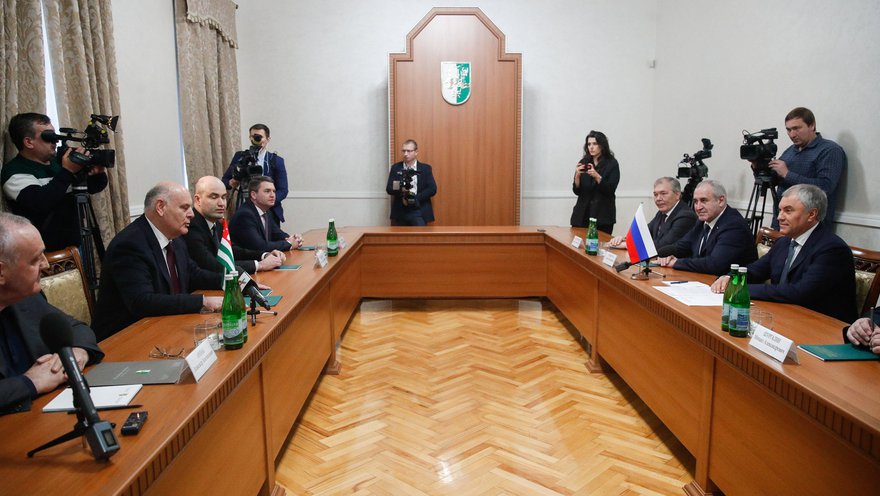
From the Russian side, the following participated in the meeting: Sergey Neverov, Leonid Kalashnikov and the Russian “Ambassador” to Abkhazia, Mikhail Shurgalin; from the Abkhaz side: the de facto Prime Minister, Alexander Ankvab, the de facto Parliament Speaker, Lasha Ashuba, the de facto Head of the Presidential Administration, Jansug Nanba.
Meeting with the Chairman of the De Facto Parliament
After the meeting with Bzhania, Volodin met with the Speaker of the de facto parliament, Lasha Ashuba. The meeting discussed the development of “parliamentary” dialogue and topical issues of bilateral relations, including the parliamentary control over the implementation of the active contractual basis.
From the Abkhaz side, deputies to the de facto speaker participated in the meeting: Fazlibey Avidzba, Astamur Arshba and Ashot Minosyan; from the Russian side: Sergey Neverov, Leonid Kalashnikov, Mikhail Shurgalin.
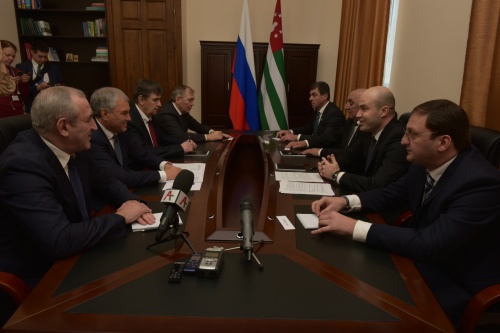
Volodin addressed the de facto parliament of Abkhazia. During his speech he touched upon the issue of trade growth and the development of tourism between the two “countries.” According to him, Abkhazia is the second in the list of five most attractive places for Russian tourists. Volodin expressed gratitude to Abkhaz volunteers who participated in the Russian military aggression in Ukraine.
Volodin and Ashuba signed a cooperation agreement between the parliaments of the two countries, which created a working group to resolve the existing issues in a parliamentary format. The meeting of the working group will be held in a few months.
Within the framework of the visit, Volodin paid tribute to the memorial of those who died in the “Patriotic War of the Abkhaz People” in 1992-1993 and laid a wreath of flowers at the memorial in the “Battle Glory Park” in Sokhumi.

[pic] => files/kremlin/visits/po9Gn7t2sxK3TU05hDO2f786Io7kHL02.jpg ) )
High-profile visits from Russia in Abkhazia and Tskhinvali Region
 Vladimir Putin
Vladimir Putin 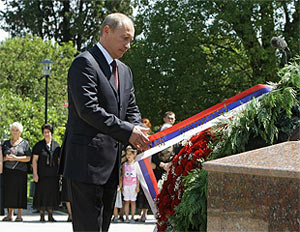
On August 12, 2009, the Prime Minister of the Russian Federation, Vladimir Putin visited Abkhazia for the first time since the 2008 Russia-Georgia War. Putin was vacationing in Sochi when he unexpectedly cut his vacation short and paid a short visit to Sokhumi. A month earlier, on July 13, 2009, President of Russia, Dimitri Medvedev, also visited Tskhinvali region for the first time since the War.

On June 2, 2011, Prime Minister of the Russian Federation, Vladimir Putin, made an unplanned visit to Abkhazia. It was his second visit to Abkhazia after the 2008 Russia-Georgia War. Putin attended the funeral of the de facto President of Abkhazia, Sergei Baghapsh. Baghapsh, who was the de facto President of Abkhazia since 2005, died in a hospital in Moscow on May 29, 2011. He was undergoing an operation on his lungs. Putin personally honored Baghapsh’s memory and expressed his condolences to his daughter and widow.

On August 25, 2013, President of the Russian Federation, Vladimir Putin, visited Abkhazia in his Presidential position for the first time. This was his third visit to Abkhazia since the 2008 Russia-Georgia War. Putin met the de facto leader of Abkhazia, Aleksandre Ankvab in Bichvinta, in a government (former Soviet) dacha (the dacha was a popular resting place for Soviet leaders, built at the order of the Secretary of the Central Committee of the Communist Party of the Soviet Union, Nikita Khrushchev in 1960. It was during his vacation at this dacha that Khrushchev learned about the fact that he had been deposed by the Plenum of the Central Committee of the Communist Party of the Soviet Union. In 1974, Khrushchev’s successor, Leonid Brezhnev, even hosted French President Georges Pompidou at the dacha).
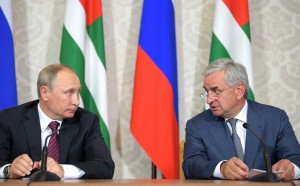
On August 8, 2017, after a four-year interval, President of the Russian Federation, Vladimir Putin, paid a short (total of 2 hours) visit to Abkhazia on the 9th anniversary of Russia-Georgia War. Putin flew to Bichvinta on a helicopter, where he met the de facto President, Raul Khajimba, face to face, on a government dacha formerly designated for Soviet leaders. Putin’s visit in 2013 also took place on this dacha. This was Putin’s second visit to Abkhazia as a President and his fourth visit overall, as President and Prime Minister. Apart from Putin’s helicopter, seven more helicopters landed on the landing pad in Bichvinta resort zone, after which, meeting with Khajimba started. The meeting lasted half-an-hour. After this, an extended delegation meeting was held. After the end of the meeting, Putin and Khajimba headed to Sochi by helicopter, where they attended a martial arts tournament in Sambo.
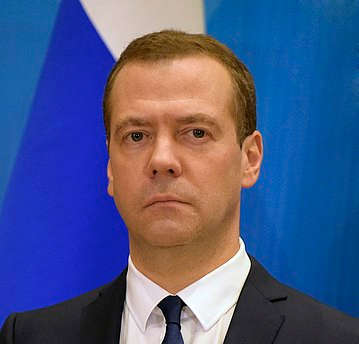 Dmitry Medvedev
Dmitry Medvedev 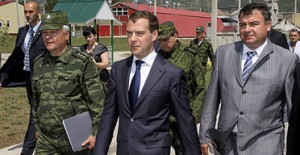
On July 13, 2009, President of the Russian Federation, Dimitri Medvedev, visited Tskhinvali for the first time since the 2008 Russia-Georgia War. He flew to Tskhinvali by a helicopter from Mozdok military base in North Ossetia. Medvedev was met by thousands of applauding supporters in Tskhinvali. Medvedev’s visit was a surprise not only for the population, but Ossetian officials as well, including de facto President Eduard Kokoiti.
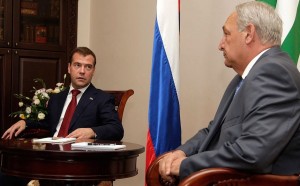
On August 8, 2010, on the second anniversary of Russia-Georgia War, the President of the Russian Federation, Dimitri Medvedev, paid an unplanned visit to Abkhazia. This was his first visit to Abkhazia after the 2008 Russia-Georgia War. Also, this was the first visit of a Russian President to Abkhazia. Prior to that, Vladimir Putin visited Abkhazia as a Prime Minister in 2009.
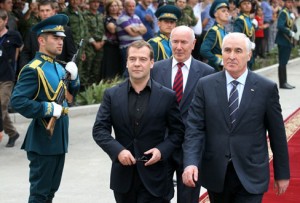
On August 8, 2012, on the fourth anniversary of Russia-Georgia War, Prime Minister of the Russian Federation, Dimitri Medvedev, visited Tskhinvali region. Medvedev met with the de facto President of Tskhinvali Region, Leonid Tibilov, mainly focusing on the War and issues of Tskhinvali Region’s security. According to Medvedev’s statement, “four years ago people died as a result of a barbaric aggression”, “Russia had to make a decision about protecting the population of South Ossetia and repelling the aggressor. This happened timely and swiftly enough to avoid further losses. I will not hide that this was a special day for me, as I had to make difficult, including military decisions, which, ultimately, restored balance and what is more important, brought peace to South Ossetia. This was a correct and just decision”. According to Medvedev, Russia would boost assistance to Tskhinvali Region as well as “the protection of the people of South Ossetia”.
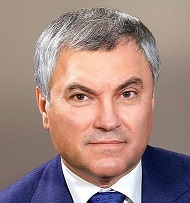 Vyacheslav Volodin
Vyacheslav Volodin 
On December 1, 2022, the Chairman of the State Duma of the Russian Federation, Vyacheslav Volodin, paid visit to the occupied Abkhazia. The official purpose of Volodin's visit was to sign a cooperation agreement between the Russian State Duma and the de facto parliament of Abkhazia.
 Sergey Lavrov
Sergey Lavrov 
On September 14, 2008, soon after the end of the 2008 Russia-Georgia August War, Minister of Foreign Affairs of the Russian Federation, Sergei Lavrov, visited Abkhazia. De facto leaders of Abkhazia, President Sergei Baghapsh, Speaker of Parliament, Nugzar Ashuba, Minister of Foreign Affairs, Sergei Shamba and other members of de facto government met Lavrov in Sokhumi airport.

On September 15, 2008, soon after the end of the 2008 Russia-Georgia War, Minister of Foreign Affairs of the Russian Federation, Sergei Lavrov, visited Tskhinvali Region. This was Lavrov’s first visit to Tskhinvali after the August 26, 2008 Russian recognition of the independence of Tskhinvali Region. Before that, on September 9, diplomatic relations were established between Russia and Tskhinvali Region. Lavrov arrived in Tskhinvali from Sokhumi and his visit lasted several hours. Lavrov’s delegation included his Deputy, Curator of Post-Soviet States, Gregori Karasin, Director of the 4th CIS Department of the Ministry of Foreign Affairs of Russia, Andrei Kelin, Ministry’s official representative, Andrei Nesterenko and Ambassador at Large, Yuri Popov.

On October 2-3, 2009, Minister of Foreign Affairs of the Russian Federation, Sergei Lavrov, visited Abkhazia. This was Lavrov’s second visit to Abkhazia after the August 26, 2008 Russian recognition of Abkhazian independence – the first one took place on September 14, 2008. In terms of the visit, Lavrov met the de facto President of Abkhazia, Sergei Baghapsh and de facto Minister of Foreign Affairs of Abkhazia, Sergei Shamba. Lavrov’s visit to Abkhazia took place two days after the publishing of the report by EU research commission on the reasons of 2008 Russia-Georgia War.

On April 25, 2011, Minister of Foreign Affairs of the Russian Federation, Sergei Lavrov, visited Tskhinvali Region. A day after he visited Sokhumi. Lavrov’s visit was pre-planned and his delegation included the Head of North Ossetian Republic of Alania, Taimuraz Mamsurov, Deputy Minister of Foreign Affairs of Russia, Grigori Karasin, Director of the 4th CIS Department of the Ministry of Foreign Affairs of Russia, Andrei Kelin, and “Ambassador” of Russia to Tskhinvali region, Elbrus Kargiev.
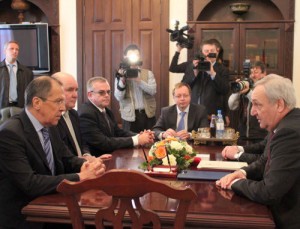
On 26 April, 2011, the Minister of Foreign Affairs of the Russian Federation, Sergei Lavrov, visited Abkhazia. A day earlier, Lavrov was visiting Tskhinvali Region. At the beginning of the visit, Lavrov honored the memory of those killed in the Georgian-Abkhazian confrontation, at the glory memorial, together with the de facto Prime Minister of Abkhazia, Sergei Shamba. From there, he went on foot to the de facto President’s administration building, where he first met the de facto President Sergei Baghapsh and later met with the members of the de facto government in an extended format.
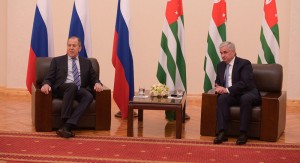
On April 18-19, 2017, the Minister of Foreign Affairs of the Russian Federation, Sergei Lavrov, paid his fourth visit to Abkhazia after the 2008 Russia-Georgia August War. His previous visit to Abkhazia took place in 2011. This time, the main purpose of the visit was to open the new Russian “Embassy” building in Abkhazia. However, non-formal reasons of the visit also included getting acquainted with the leaders of the Parliament elected as a result of March 12, 2017 illegitimate elections, as well as presenting new Russian “Ambassador” to Abkhazians.